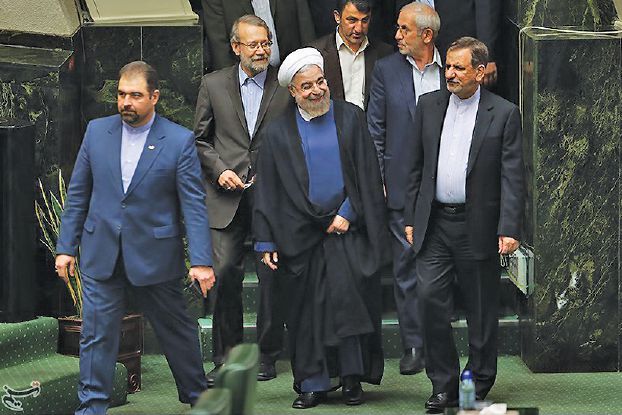Iran declares ‘good news’ as nuclear deal appears imminent
By MICHAEL WILNER/J.Post/07/12/2015
VIENNA — Negotiations over Iran’s nuclear program appear to have reached their penultimate moment as Tehran’s nuclear chief, Ali Akbar Salehi, declared “good news” to gathered press on Saturday night. Entering the Palais Coburg in Austria’s capital, where the talks have taken place for fifteen straight days, Salehi spoke after Iranian officials briefed their press corps on the importance of the night ahead. Iranian Foreign Minister Mohammad Javad Zarif met with US Secretary of State John Kerry for an hour and a half this evening, which was followed by a full plenary of diplomats from world powers— the US, Britain, France, Russia, China and Germany— that went through midnight. The meetings came after the Iranians released photos of their top delegates sifting through stacks of papers, taking phone calls and working on laptops, all wearing large smiles. The American delegation has been largely silent, though earlier in the day, Kerry sent out a message on Twitter suggesting that more work needed to be done to resolve some “difficult issues.”
Drafting of the deal’s text is said to be complete, according to the EU’s foreign policy chief. Going into consequential talks on Saturday night, all that was left, it appeared, was a small set of political decisions to be settled by all sides. In a briefing by their delegates, Iranian journalists were told that specific language for a key United Nations Security Council resolution still proved a political challenge in the eleventh hour of the negotiations. The Jerusalem Post was not represented at the briefing and cannot independently verify the reports. “Now that everything is on the table, the moment has come to decide,” Fabius said, exiting a meeting with Kerry earlier in the evening. World powers seek to cap, restrict, monitor and partially roll back Iran’s nuclear work in exchange for permanent sanctions relief. Iran wants that relief immediately.
Israel opposes the deal in its current form.
Rouhani: In nuclear talks, Iran has ‘charmed the world, and it’s an art’
By REUTERS /07/11/2015
DUBAI – Iranian President Hassan Rouhani said on Saturday that if nuclear talks with major powers succeeded, the world would see that Tehran had solved its biggest political problem by negotiation and logical argument, Nasim news agency reported. “Even if the nuclear talks fail, our diplomacy showed the world that we are logical. We never left the negotiation table and always provided the best answer,” Nasim quoted him as saying in a meeting with artists. “Twenty-two months of negotiation means we have managed to charm the world, and it’s an art,” he was quoted as saying. Separately, Iranian Supreme Leader Ayatollah Ali Khamenei told a meeting of students in Tehran on Saturday that the United States is the “true embodiment of global arrogance”, according to remarks posted on his website. Answering a student who asked him what would happen to the ‘fight against global arrogance’ after the completion of nuclear talks Khamenei replied that that fight could not be interrupted, his website said. Khamenei was quoted as saying: “Fighting global arrogance is the core of our revolution and we cannot put it on hold. Get ready to continue your fight against the global arrogance.”
“The US is the true embodiment of the global arrogance.”
Iran, the United States and other major powers struggled on Saturday to break a deadlock in nuclear talks that has held up a historic deal that would bring sanctions relief for Tehran in exchange for curbs on its atomic program. Tehran and the six powers have given themselves until Monday to reach a nuclear agreement, their third extension in two weeks, as the Iranian delegation accused the West of throwing up new stumbling blocks to a deal. Western powers have long suspected Iran of aiming to build nuclear bombs and using its civilian atomic energy program to cloak its intention, an accusation Iran denies.The term arrogants, or arrogant powers, is used in Iran to refer to the United States and its Western and Israeli allies. Washington cut ties with Tehran a year after the 1979 revolution that ushered in Iran’s Shi’ite Muslim theocracy.

















